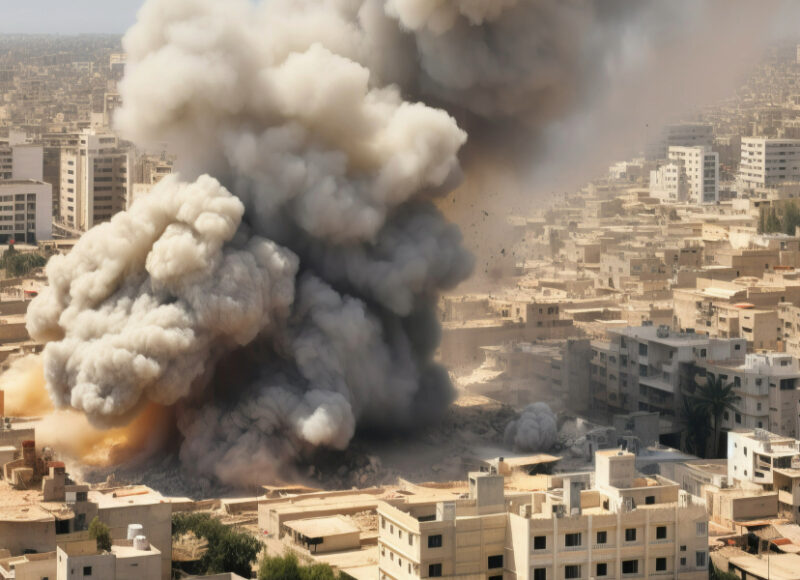
Hate Crime and Extremism in Austria on the Background of the Middle Eastern Conflict
Hate Crime and Extremism in Austria on the Background of the Middle Eastern Conflict
Policy Brief November 2024
By Daniela Pisoiu
This Policy Brief was produced as part of the cooperation between oiip and the Ministry of Defense.
Executive Summary
Drawing on the research insights of the EU funded research project PARTES[1], this policy brief outlines the sharp rise in hate crimes in Austria following the outbreak of the conflict in Gaza in response to the Hamas terrorist attack of October 7, 2023. The paper outlines the modus operandi behind these hate crimes and furthermore highlights the nature of the narratives and motivations accompanying them. Austrian Jewish communities are particularly affected by these incidents, as increasing anti-Israel sentiments often translate into acts of antisemitism. At the same time, anti-Muslim narratives and increasing anti-Muslim racism have led to intensified hostilities against Muslim communities.
The paper proposes several policy recommendations, including enhanced surveillance, efforts to counter radicalisation, interfaith dialogue, and awareness raising campaigns. These measures aim to address the risks posed by violent extremism and ensure the safety of its religious communities.
Zusammenfassung
Aufbauend auf den Forschungseinsichten des durch die EU geförderten PARTES Projektes, skizziert dieser Policy Brief den starken Anstieg von Hassverbrechen in Österreich nach Ausbruch des Gaza-Konflikts als Reaktion auf den Hamas-Terroranschlag vom 7. Oktober 2023. Das Papier skizziert die Vorgehensweise hinter diesen Hassverbrechen und beleuchtet darüber hinaus die Natur der Erzählungen und Motivationen, die sie begleiten. Österreichische jüdische Gemeinden sind von diesen Vorfällen besonders betroffen, da zunehmender Antisemitismus häufig zu antisemitischen Handlungen führen. Gleichzeitig haben antimuslimische Narrative und zunehmender antimuslimischer Rassismus zu verstärkten Feindseligkeiten gegen muslimische Gemeinschaften geführt.
Das vorliegende Papier schlägt mehrere Maßnahmen für den Schutz von Kultstätten vor, darunter: verstärkte Überwachung, Bemühungen zur Bekämpfung der Radikalisierung, interreligiöser Dialog und Sensibilisierungskampagnen. Diese Maßnahmen zielen darauf ab, den Risiken des gewalttätigen Extremismus entgegenzuwirken und die Sicherheit von Kultstätten zu gewährleisten.
Keywords: terrorism, places of worship, Gaza, Israel, hate crime
Hate crimes after October 10th
The Israel-Hamas conflict has had significant ramifications in Europe, including Austria. Various jihadi terrorist and various Salafi actors have instrumentalized the conflict to promote their ideologies; Daesh (the so-called Islamic State) has furthermore called for attacks against Jewish targets and European targets more broadly. At the same time, right-wing extremists in Europe have increasingly mobilized against Muslim places of worship, Islamic symbols and persons wearing the headscarf.
In Austria, civil society organisations such as the Israelitische Kultusgemeinde Wien (Jewish Community Vienna) and the Dokustelle Islamfeindlichkeit & antimuslimischer Rassismus (Documentation Centre Islamophobia and Anti-Muslim Racism) have registered a sharp rise in antisemitic and Islamophobic incidents after October 10th which points to a correlation between geopolitical tensions and domestic extremism (see below). In the first 10 days of the conflict alone, 76 antisemitic incidents were reported, which amounts to a 300% increase compared to the same period in previous years (ORF 2023). By March 2024, this number had further escalated, with a 500% increase in daily reported incidents, averaging 8.3 per day (IKG 2023). Incidents have included acts of vandalism, such as the desecration of Holocaust memorial stones and the tearing down of flags.
However, in addition to antisemitic crimes, there has been a worrying increase in Islamophobic incidents. The Dokustelle reported more cases of anti-Muslim hate speech and racism between October and December 2023 than in the entire preceding year (Wurmstädt 2023). The interplay between antisemitic and anti-Muslim sentiments appears to be intensifying as both communities face growing hostility.
Based on the data collection in the project PARTES, some of the more prominent incidents between October 2023 and June 2024 (PARTES n.d.), in Austria were: In December 2023, authorities thwarted an attack on a synagogue by a 16-year-old Daesh sympathiser, who had collected resources and devised plans to carry out the assault. The arrest revealed a stockpile of Daesh propaganda and instructions to build bombs. Moreover, multiple Afghan and Syrian refugees were arrested in Bosnia and Austria for plotting attacks on Jewish institutions, a plot which is likely connected to the conflict in Gaza.
The data analysed in the PARTES project with regard to the modus operandi in the case of attacks against places of worship indicates that perpetrators of hate crimes tend to use unsophisticated methods that often involve everyday objects and little planning. Individuals who carry out these incidents usually have no formal ties to extremist networks, yet their actions reflect rising levels of antisemitism and anti-Muslim racism within Austrian society.
Against the background of the conflict in Gaza which has exacerbated existing tensions, perpetrators appear to be increasingly motivated by geopolitical developments. Austrian Jewish communities are often falsely linked to Israel’s actions, and anti-Israel sentiment frequently translates into antisemitic attacks. Similarly, anti-Muslim rhetoric, fuelled by public debates about Muslim students in schools and the publication of controversial studies, appears to have contributed to rising tensions and the radicalisation of individuals.
Security measures
In the wake of the Gaza conflict, the Austrian government has raised the terrorism threat level to the second highest, acknowledging the rising threat posed by violent extremism. Increased protection was afforded to critical infrastructure and Jewish institutions. Subsequent to further escalations, particularly the one between Iran and Israel, security around Jewish institutions was further tightened. At the same time, within both the Islamist and the extreme leftist scenes, incitements to violence against Israeli and Jewish targets have emerged and these have in part lead to low-level physical attacks (for more details on this see the PARTES report). Despite governmental efforts to curb extremist tendencies, there is still a rise in societal tensions, as well as in incidents of hate crimes against both Jewish and Muslim communities. Furthermore, demonstrations, graffiti, and physical assaults are being recorded as extremist actors continue to motivate individuals driven by antisemitic and anti-Muslim narratives. At the same time, Austria’s unconditional support for the Israeli counteroffensive in Gaza has been successfully instrumentalised by Islamist actors to promote their own ideologies, which can lead to a significant increase in radicalisation tendencies.
Recommendations
Against the background of the rising threat of violent extremism in Austria, the following policy recommendations can be proposed:
- Increased Surveillance and Protection of Places of Worship: Security measures should be intensified around all places of worship (PoW), in order to ensure the safety of all religious communities. This can include for example installing more surveillance systems and monitoring high-risk areas through special security forces.
- Address Radicalisation Online: Increase efforts to combat and counteract radicalisation in particular in online spaces where extremist propaganda is blooming. State funded programmes should focus on educating young people and in particular frontline workers in the educational and social sectors with regard to extremist narratives, imagery and strategies and promoting constructive discussion formats on conflicts, ideally with the involvement of civil society and religious communities.
- Support Interfaith Dialogue: Encourage interfaith dialogue and community cohesion through government-supported initiatives that foster understanding between different religious and cultural groups.
- Awareness Raising Campaigns: Invest in awareness raising campaigns focusing on the conflict in Gaza, with an emphasis on targeting misinformation and disinformation spread by extremist (foreign) actors, and informing about the historical and political underpinnings of the conflict. These campaigns should furthermore promote tolerance and emphasise the negative consequences of hate speech and violent extremism. Funding for extremism prevention could be expanded to include this scope and should be available to think tanks and civil society organisations.
- Monitoring and Reporting: Establish a more comprehensive system for monitoring and reporting hate crimes with the involvement of both ministries and the civil society, ensuring that incidents targeting all religious communities are documented and investigated thoroughly.
Conclusion
Austria’s current security landscape is deeply affected by geopolitical conflicts, in particular the ongoing war in Gaza. The increase in antisemitic and anti-Muslim incidents and hate crimes highlights the need for continued vigilance and proactive measures to fight violent extremism and radicalisation. Through stronger security protocols, efforts to counter radicalisation, and awareness raising campaigns, Austria can address the risk posed by violent extremist actors and ensure the safety of its religious communities and the society at large.
Bibliography
IKG 2023, Israelitische Kultusgemeinde Wien, Verfünffachung der antisemitischen Vorfälle seit Hamas-Massaker, 13 March, https://www.ikg-wien.at/nachrichten/verfuenffachung-der-antisemitischen-vorfaelle-seit-hamas-massaker
ORF 2023, Starker Anstieg bei antisemitischen Vorfällen, 22 October, https://wien.orf.at/stories/3229381/
PARTES n.d. (2024) Deliverable D3.4 Protective and Preventive Measures Report, forthcoming.
Wurmstädt, M. (2023) Dokustelle warnt: Immer mehr Fälle von antimuslimischem Rassismus, Der Standard, 7 November, https://www.derstandard.at/story/3000000194119/dokustelle-warnt-immer-mehr-faelle-von-antimuslimischem-rassismus
[1] PARTES (Participatory approaches to protecting places of worship) is a project funded by the Internal Security Fund of the EU (ISF-2022-TF1-AG-PROTECT, number 101100542). Views and opinions expressed are however those of the author(s) only and do not necessarily reflect those of the European Union or the European Commission. Neither the European Union nor the granting authority can be held responsible for them. Insights comprised in this report are based on the report D3.4 Protective and Preventive Measures Report, forthcoming on www.partes-project.eu.
Downloads
